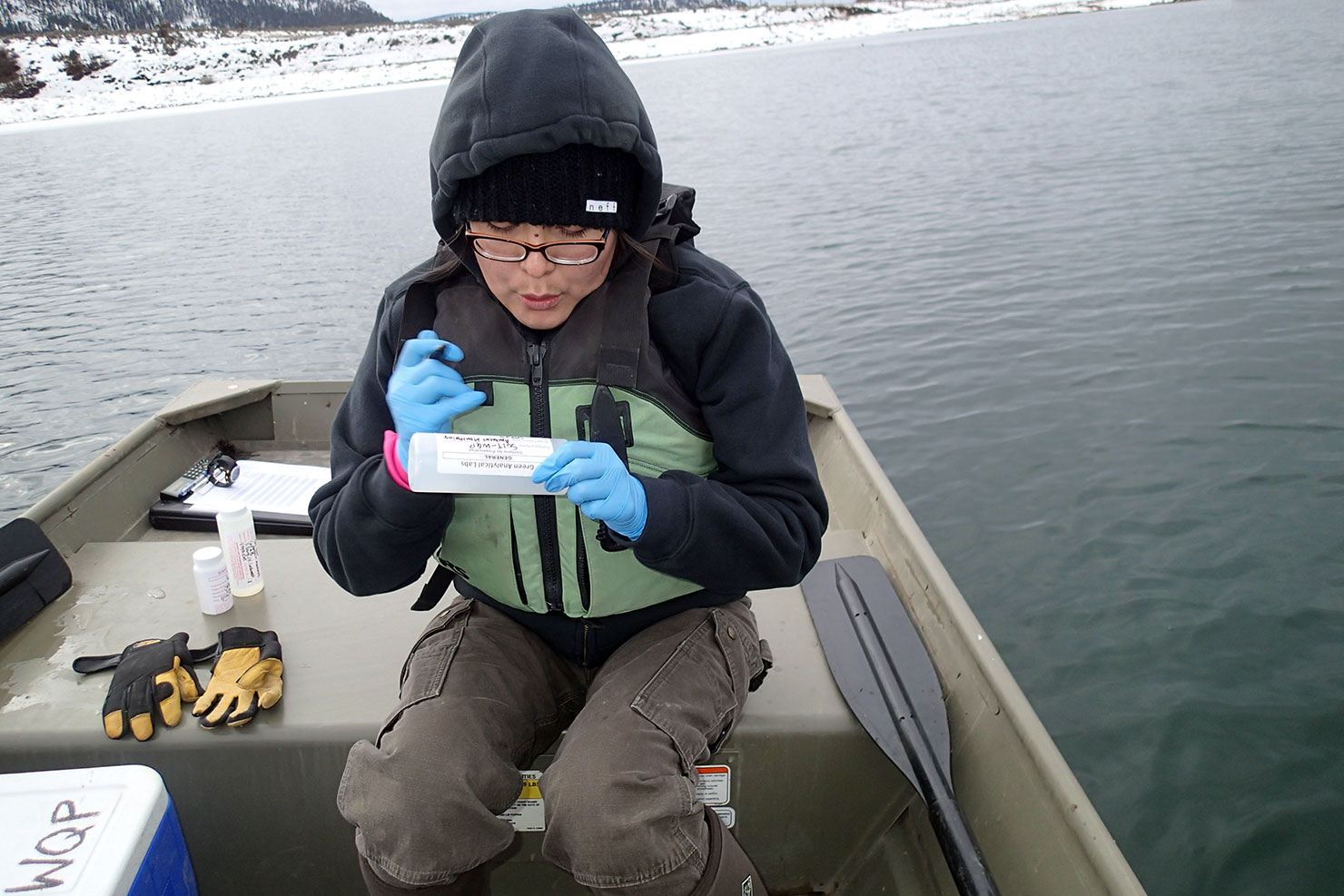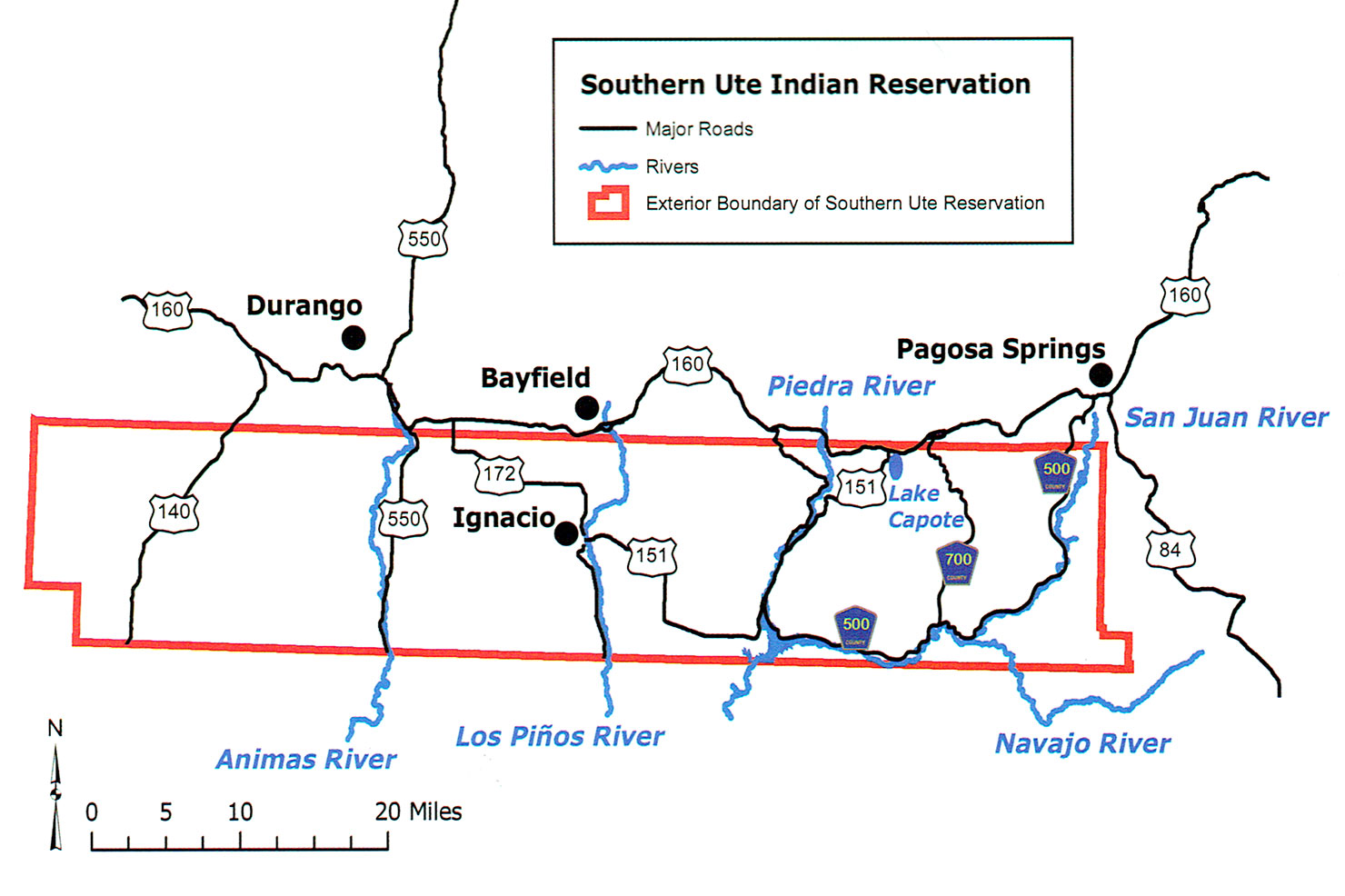The Southern Ute Indian Tribe Water Quality Program (WQP) is directed by Tribal Council to Protect and Restore Tribal Waters for the benefit of the Tribal Membership. To meet this goal, WQP, an office of the Environmental Program Division, engages in several activities on the Reservation’s lakes, streams and groundwater resources. There are two main objectives for the Water Quality Program: Protection of current high quality waters and restoration of degraded waters and to bring degraded waters back to high quality. Working with SUIT Wildlife, Range and Agricultural Divisions and other SUIT agencies, the WQP strives to ensure water is suitable for cultural, drinking water, aquatic life, and agricultural uses.
To protect water quality, and to understand the health of the aquatic resource, the WQP routinely collects metals and nutrient water samples and macroinvertebrate (stream insects). Major surface waters assessed are the La Plata, Animas, Los Pinos, Piedra, Navajo, San Juan Rivers and many smaller streams that feed them. The WQP also monitors Capote Reservoir and Scott’s Pond. Using some new technology, probes are deployed in several rivers 24/7 for 8 months of the year. These probes sample and store data on temperature, oxygen levels and pH that is critical for fish and other aquatic life. Additionally, the WQP tests tribal members drinking water wells for groundwater contamination, like bacteria or selenium. This service is free of charge for tribal members on the Reservation, contact Kirk Lashmett 563-0135, klash@southernute-nsn.gov for more information.
The data collected by the WQP is used to develop Water Quality Standards (WQS). WQS specify the level of quality each river and lake should meet to not become “polluted” and also describes how to keep them at that quality. Presently, about forty Tribes (including Ute Mountain Ute) and all 50 States have WQS approved by the Environmental Protection Agency. To that end, the Southern Ute Indian Tribe of the Southern Ute Indian Reservation in Colorado has applied to the U.S. Environmental Protection Agency (EPA) for program authority to administer the Water Quality Standards program under the Clean Water Act. This program authority is also referred to as Treatment in a Similar Manner as States, or TAS. EPA is reviewing the tribe’s application and will solicit comments on the tribe’s assertion of authority in its application through February 3, 2017.
The Southern Ute Tribe has been working to obtain this authority since the mid 90’s, generating a large amount of water quality data that is used to develop the science behind these standards. The program also maintains an active river restoration program to help heal streambank erosion and prevent runoff from producer’s fields that can contribute excess nutrients, sediment and bacteria to Tribal waters. These pollutants can impact fish health and their habitat and be harmful to humans while recreating. The Water Quality Program used Tribal WQS extensively during the Gold King Mine spill to document impacts to Tribal Waters and understand when the Animas River was back to normal conditions.
The most common water quality issue on the Reservation is sedimentation from degraded stream banks and excessive nutrients. Sediment can smother stream beds and kill the insects fish like to eat. Nutrients are an essential part of river and lake ecosystems, but when they are in excess, they cause prolific aquatic plant life growth. This plant life can cause changes to oxygen and pH levels, which results in stress to fish and other aquatic life, sometimes leading to death.
If waters are not of a good quality, the WQP’s Non-Point Source Program works to help correct the problem. The WQP works with farmers and ranchers within the exterior boundary of the Reservation to improve irrigation through our Cost Share Program. This program improves the effectiveness of irrigation by supplying gated pipe to producers on the Reservation. The program also assists in the planting of field filter strips and buffers, and other measures to reduce runoff from irrigated lands. The non-point source program also is willing to provide technical assistance to local farmers and ranchers to improve water quality.
The Non-Point Source program also reduces sediment pollution by stabilizing stream banks that are eroding due to instability. The program uses native materials and natural channel design techniques to prevent excess sediment from fouling fish habitat and damaging infrastructure. The program revitalizes and protects the riparian zone, the areas around the rivers, by planting native riparian plants that benefit water quality, wildlife and all Tribal members. Contact Pete Nylander pnylan@southernute-nsn.gov for more information to how to become involved in any Non-Point Source programs.
The WQP seeks tribal members assistance in the development of the WQS and other programs that protect Tribal Resources. Please see the advertisement for the vacancy on page XXX of the Drum or contact WQP Program Manager Curtis Hartenstine 563-2217 charten@southernute-nsn.gov for more information.




